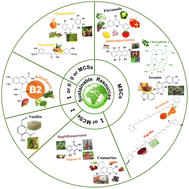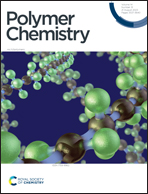Photopolymerization using bio-sourced photoinitiators†
Abstract
Over the past few decades, photopolymerization technology has rapidly evolved and been successfully applied in different fields, ranging from coating, personalized items (e.g., jewelry design and electronic components), dental and food industries, to emerging fields such as surgical medical devices and biomaterials. In response to the requirement for “green chemistry”, newly developed safe, conservative, low-energy, and simple-to-use light-emitting diodes (LED) have gradually replaced traditional light sources like high-pressure/medium-pressure mercury lamps or xenon lamps. In order to minimize the environmental impact of photopolymerization technology, additional efforts are being made to develop safe and nontoxic new photoinitiators/photoinitiating systems and monomers. Biogenic sources (flowers, fruits, vegetables, animal species, etc.) or biomimetic molecules have been identified as the most promising candidates for bio-based photoinitiators. This review mainly summarizes the current progress from 2018–2022 in photopolymerization for bio-based photoinitiators/photoinitiator systems, along with presents conditions for monomers derived from natural products.



 Please wait while we load your content...
Please wait while we load your content...